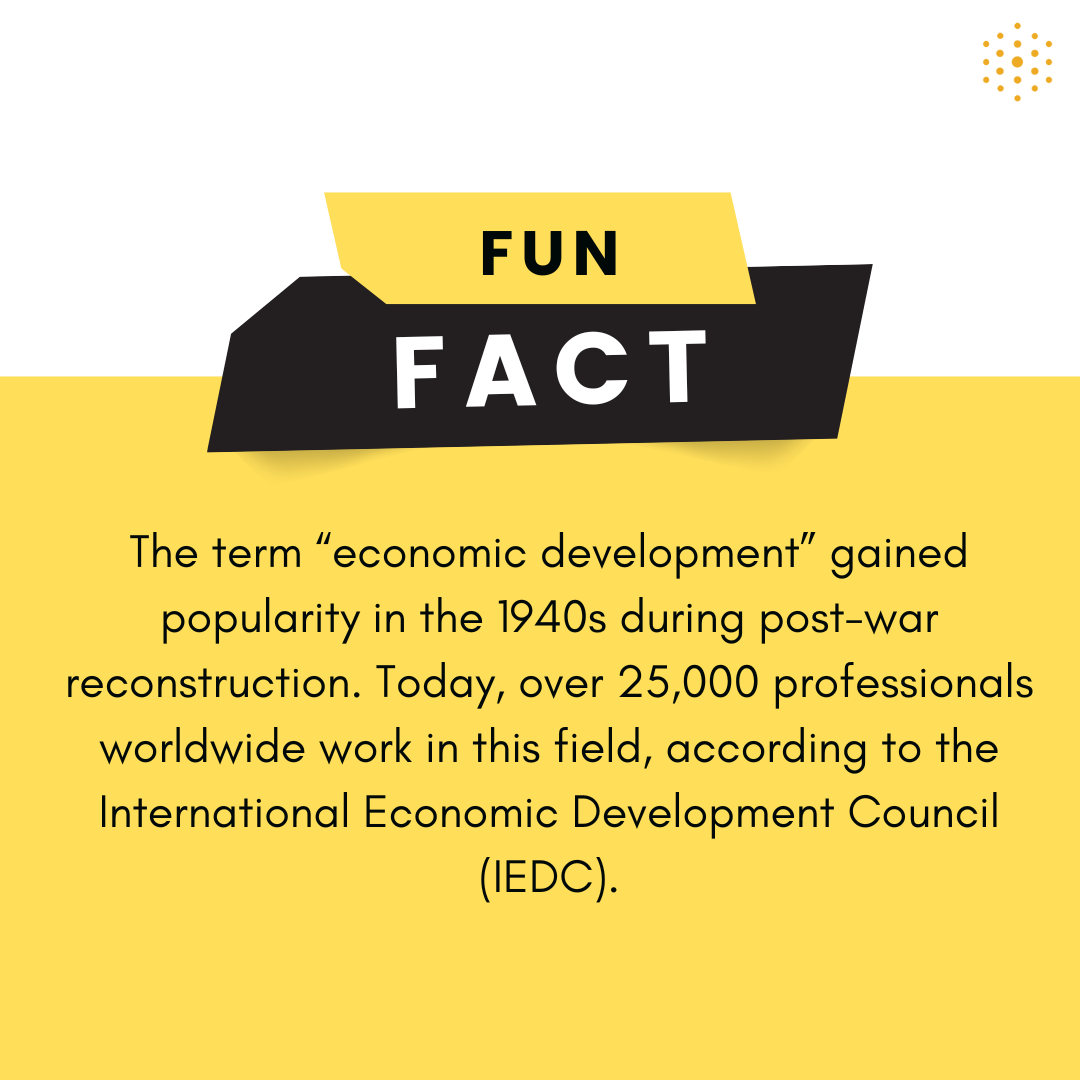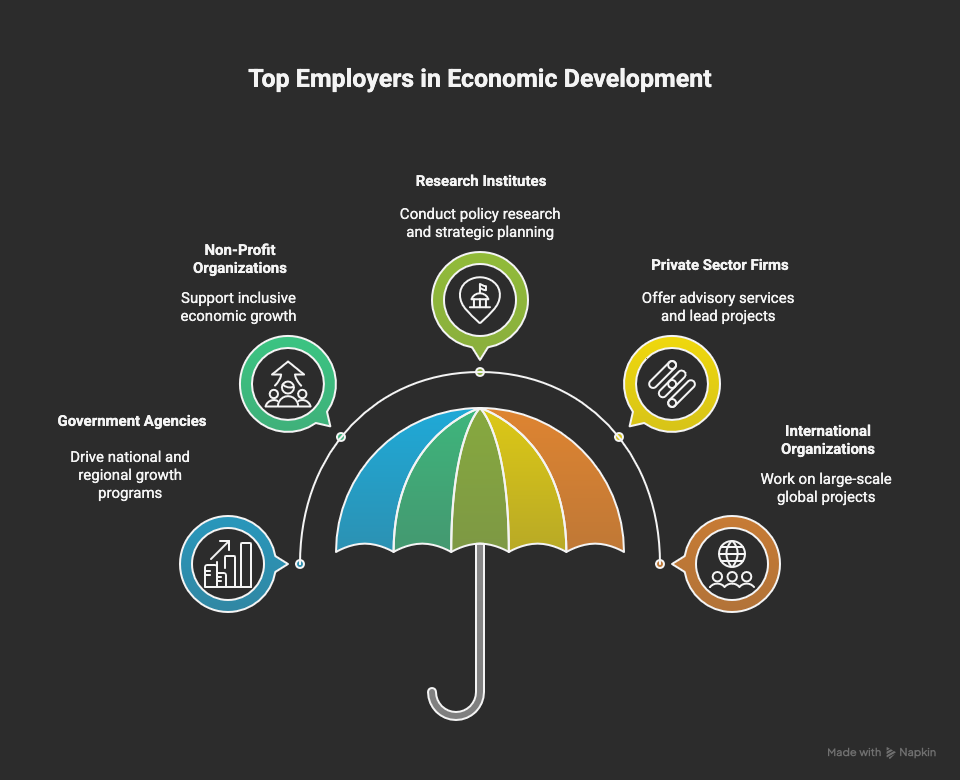What does it take to build a successful career in economic development?
Economic development careers blend data analysis, project management, and community engagement to drive growth and inclusion. Top opportunities exist in government, non-profits, consulting, and global institutions. Build skills in grant writing, research, and stakeholder communication, align with employers’ impact priorities, and showcase quantifiable outcomes on your resume to stand out in this mission-driven field.
In an era where data drives decisions and sustainable growth defines success, economic development professionals are more crucial than ever.
According to the World Economic Forum’s Future of Jobs report, analytical thinking ranks as the #1 skill of tomorrow - and economic development is a field built on that very foundation.
Whether you’re shaping regional strategies, securing funding, or building communities, the right blend of technical and interpersonal skills will set you apart.
In this post, we’ll explore the most in-demand capabilities, top hiring sectors, and resume tactics to help you land your dream role.
What Are the Most In-Demand Skills in Economic Development?
To succeed in economic development, you need a well-rounded blend of analytical, strategic, and interpersonal skills. You can work across diverse areas, from data-driven policy design to community engagement and public-private collaboration, so versatility is key.
Here are some of the top skills employers look for today:
1. Data Analysis and Research: The ability to analyze and interpret data is essential. Proficiency in tools like Excel, Tableau, Python, and GIS helps professionals assess community needs, track economic indicators, and guide strategy.
2. Strategic Project Management: Economic development projects often span multiple sectors - infrastructure, workforce, small business, and innovation. Strong project management, budgeting, and stakeholder coordination skills ensure initiatives are delivered effectively and on time.
3. Grant Writing and Financial Management: Securing and managing funding is central to this field. Professionals skilled in grant writing, budget oversight, and public-private partnerships are in high demand, especially as states and municipalities expand access to federal and philanthropic programs.
4. Stakeholder Engagement and Communication: Economic development professionals must collaborate with businesses, policymakers, educators, and community groups. Clear communication, relationship management, and negotiation skills are critical to building consensus and driving impact.
5. Marketing and Digital Outreach: Economic growth also depends on effective promotion. Skills in digital marketing, storytelling, and branding help cities, counties, and regions attract investment, talent, and tourism - all vital for long-term competitiveness.
Where Are the Job Opportunities in Economic Development?
The demand for economic development professionals in the U.S. continues to rise as governments and organizations invest in innovation, sustainability, and workforce growth.
Here are some of the fastest-growing areas creating new opportunities:
1. Technology and Innovation Hubs: Cities like Austin, Seattle, and San Francisco are leading the way in tech-driven development. Roles supporting workforce training, business incubation, and innovation ecosystems are in high demand.
2. Renewable Energy and Sustainability: With over $400 billion in clean energy investments under the Inflation Reduction Act (IRA), professionals skilled in sustainability planning, green infrastructure, and energy transition are increasingly sought after.
3. Workforce and Talent Development: Community colleges, workforce boards, and regional agencies are hiring experts to create training programs and reskilling initiatives that align with employer needs and economic priorities.

Who Are the Top Employers in Economic Development?
Top employers in economic development span across government agencies, non-profit organizations, international institutions, and the private sector.
The field offers opportunities to work at the local, national, and even global level, depending on your area of focus. Here are some of the most prominent employers:
1. Government Agencies: Government organizations are among the largest employers in this field. At the federal and state levels, agencies like the U.S. Economic Development Administration (EDA), Department of Commerce, and State Departments of Economic Development drive national and regional growth programs. Locally, city and county development authorities focus on attracting investment, expanding small businesses, and revitalizing communities.
2. Non-Profit and Community Development Organizations: Many professionals work with non-profits and public-private partnerships (PPPs) that bridge the gap between business and government. Organizations like International Economic Development Council (IEDC), National Association of Development Organizations (NADO), and community development financial institutions (CDFIs) such as LISC (Local Initiatives Support Corporation) play major roles in supporting inclusive economic growth.
3. Research Institutes and Think Tanks: Institutions like the Brookings Institution, Urban Institute, and Center for American Progress conduct policy research, evaluate programs, and offer thought leadership on urban planning, job creation, and innovation ecosystems. Roles here often blend economic analysis, policy advocacy, and strategic planning.
4. Private Sector and Consulting Firms: The private sector is a growing employer in this field. Consulting firms such as McKinsey & Company, Deloitte, PwC, and EY-Parthenon offer advisory services to governments and development agencies worldwide. In addition, tech and infrastructure firms like Microsoft, Alphabet, BlackRock, and AECOM often hire economic development professionals to lead regional engagement and sustainability projects.
5. International Organizations: For those interested in global development, organizations such as the World Bank, UNDP, OECD, and Asian Development Bank offer opportunities to work on large-scale economic policy, trade, and infrastructure projects.
Pro Tip: Where to validate employer fit quickly: skim IEDC’s “Who we are” and CEcD pages for the competency areas those employers prioritize (BRE, finance/credit analysis, real estate/reuse, marketing & attraction, strategic planning, workforce). Map your skills to those buckets before you apply.

Also Read: How to get hired during recessions?
What Should My Resume and Cover Letter Highlight?
Your resume and cover letter are your first opportunity to show that you understand both the technical and strategic sides of economic development. Employers look for candidates who can combine data analysis with community impact, so every section should reflect results and relevance.
Here’s what to emphasize:
1. Quantifiable Achievements: Employers value results. Instead of saying you “helped with a project,” use numbers:
“Secured $2.5M in grant funding for small business development.”
“Led a workforce training program that reduced unemployment by 8% in two districts.”
2. Core Competencies: Highlight skills that align with economic development job descriptions, such as:
- Business Retention and Expansion (BRE)
- Grant Writing and Fundraising
- Community Engagement and Stakeholder Management
- Project Management and Budget Oversight
- Data Analysis and Reporting (Excel, Tableau, Python)
3. Policy and Impact Orientation: Show that you understand how programs tie into broader economic goals, like workforce development, infrastructure, or entrepreneurship. Use action verbs like evaluated, facilitated, strategized, or implemented.
4. Tailored Cover Letter: Your cover letter should demonstrate that you’ve researched the organization and can align your skills with their mission. Briefly mention specific programs or initiatives you admire and how you can contribute to their growth. For example:
“Having managed public-private partnerships to attract renewable energy investments, I’m excited by your agency’s commitment to green infrastructure and inclusive growth.”
5. Certifications and Continuous Learning: Consider including certifications such as the Certified Economic Developer (CEcD) credential from the IEDC or courses in data analytics, project finance, or policy management. These show commitment to professional growth.
Conclusion
Building a career in economic development requires more than just passion, it takes strategic upskilling, real-world experience, and the ability to showcase your impact effectively.
Whether you’re applying for government, non-profit, or private-sector roles, a well-structured resume and confident interview performance can make all the difference.
That’s where Hiration can help.
With AI-powered support for resume building, interview preparation, and LinkedIn optimization, you can present your skills with clarity and confidence and stand out in a competitive job market.
Take the next step toward shaping the communities and economies of tomorrow with a career profile that truly reflects your potential.
Economic Development Careers — FAQ
What skills are most important for economic development professionals?
Employers seek strong data analysis, project management, grant writing, stakeholder engagement, and communication skills. Proficiency with tools like Excel, Tableau, Python, and GIS is especially valuable.
Where are the biggest job opportunities in this field?
High-growth sectors include renewable energy, workforce development, and tech-driven innovation hubs. Government and non-profit agencies are major employers, alongside consulting firms and global organizations.
Which organizations hire economic development professionals?
Top employers include the U.S. Economic Development Administration, Department of Commerce, CDFIs like LISC, think tanks such as Brookings, and consulting firms like Deloitte, PwC, and McKinsey.
Do international organizations offer career paths in this area?
Yes. Institutions like the World Bank, UNDP, OECD, and Asian Development Bank employ professionals in roles focused on infrastructure, trade, and sustainable growth globally.
How can I tailor my resume for economic development roles?
Show measurable results such as “secured $2.5M in grants” or “reduced unemployment by 8%.” Highlight competencies in grant writing, project management, and stakeholder relations to reflect both technical and community impact.
What credentials strengthen my application?
Certifications like the Certified Economic Developer (CeCD) credential and coursework in data analytics, policy, or project finance demonstrate specialization and commitment to continuous learning.
Is the field more public- or private-sector oriented?
While most roles exist in public and non-profit sectors, private companies and consulting firms are expanding into regional development, sustainability, and economic strategy work.
How do I know if I’m a good fit for economic development work?
If you enjoy data-driven problem solving, community impact, and cross-sector collaboration, this field offers both meaningful work and long-term stability.
What’s the best way to prepare for interviews in this field?
Be ready to discuss past outcomes with data and context. Show how your projects supported measurable growth or aligned with public policy goals, and demonstrate understanding of funding and stakeholder ecosystems.



